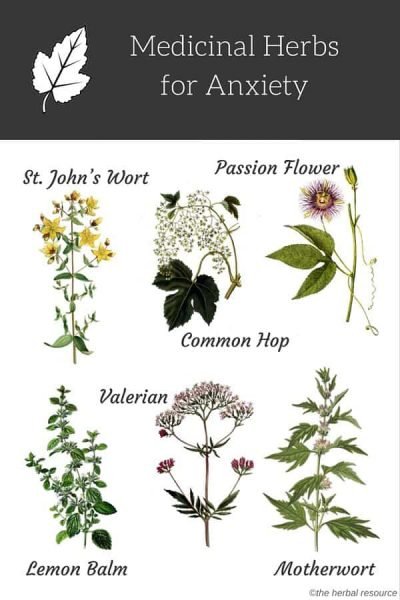The use of natural herbs for anxiety to ease the often paralyzing and uncomfortable sensation that go with this condition is not uncommon.
Anxiety disorder is the most prevalent mental health issue in many western countries and using herbal medicine for anxiety has attracted much attention in recent times.
Medicinal herbs for anxiety tend to have fewer side effects, are less likely to cause dependency and are cost-effective.
Care should be taken when altering any medications or adding supplements and close attention to drug interactions should be made before taking any herbal remedy.
The cause of anxiety must be investigated thoroughly with a professional healthcare practitioner, and medicinal herbs should be viewed as part of a holistic approach to better health.
Common Herbs for Anxiety Treatment
St. John’s Wort
The mild action of this antidepressant herb has led to it being one of the most popular of all medicinal herbs and is considered the most reliable herb to consider for treating anxiety.
St. John’s Wort (Hypericum perforatum) has the added benefit of being a gentle sedative and can assist in treating insomnia.
The St. John’s wort’s flowers contain hypericin and hyperforin both considered to be vital components in the mood-lifting action of this herb.
The action of these compounds is enhanced by the flavonoid glycosides naturally found in this plant, and a good supplement will have standardized amounts of hypericin and flavonoid glycosides.
Caution is warranted for people who are taking warfarin, digoxin and some drugs used to treat HIV (indinavir and nevirapine), chemotherapy medications such as irinotecan, and antihistamines, benzodiazepines, and simvastatin.
Consulting a healthcare practitioner is advisable before beginning any new medication and in the case of St. John’s Wort, it is recommended to discontinue for seven days before a general anesthetic.
Passionflower
Passionflower (Passiflora incarnata) has a tranquilizing effect on the nervous system and is indicated specifically for anxiety and insomnia.
With a reputation as non-habit-forming medication for anxiety, passionflower has been indicated in preparations for alcohol, nicotine and opiate withdrawal.
This herb is extremely gentle in its action and should be considered for insomnia associated with anxiety before using valerian.
Valerian
Valerian root (Valeriana officinalis) is possibly one of the most pungent herbs in use. This strong-smelling herb is famous for being the plant that Valium was derived from.
It is one of the more potent calmatives in use and care should be taken when using valerian for more than three weeks for insomnia associated with anxiety.
Valerian can cause drowsiness, and prolonged use may disrupt deep sleep which can lead to tiredness, even after a full night´s sleep.
Hops
Hops (Humulus lupulus) is primarily a sedative and is often combined with passion flower to enhance its action to treat nervous tension and insomnia.
A recent German study concluded that as a substitute to benzodiazepines, hops and valerian provided a viable alternative. Caution should be used when prescribing hops for anxiety if depression is thought to be involved.
Lemon Balm
Another herb often prescribed by herbal practitioners is lemon balm (Melissa officinalis)
. Preliminary research shows it can be helpful in reducing nervousness and excitability, symptoms commonly associated with anxiety.
The herb is considered safe to use and well-tolerated by most people. It is considered safe for short-term use, but it has been known to cause nausea and abdominal pain.
Other Herbs Used for Anxiety
- Cowslip – (Primula veris)
- Bugleweed – (Lycopus europaeus)
- Hyssop – (Hyssopus officinalis)
- Fennel – (Foeniculum vulgare)
- Jamaica Dogwood – (Piscidia piscipula)
- Maritime Pine Bark – (Pinus pinaster)
- Mistletoe – (Viscum album)
- Lemon Grass – (Cymbopogon citratus)
- Vervain – (Verbena officinalis)
- Self Heal – (Prunella vulgaris)
- Sweet Basil – (Ocimum basilicum)
- Bergamot – (Citrus bergamia)
- Ginkgo Biloba – (Ginkgo Biloba)
- Motherwort – (Leonurus cardiaca)
- Pheasant’s Eye – (Adonis vernalis)
- Black Horehound – (Ballota nigra)
Using Herbal Supplements to Treat Anxiety
Like all medication, any herbal treatment for anxiety must be taken as part of an overall approach to recovery. Natural herbs for anxiety are most of the time gentle in their action, and the bonus is that an herbal remedy for anxiety is less inclined to cause dependency or side effects.
When looking to use an herbal remedy for anxiety, it is essential to investigate whether or not there is also depression; so that an appropriate formula can be prescribed.
Overwork, poor diet and stress all contribute to anxiety and often simple measures to break the cycle of what is causing anxiety can lead to a significant improvement in overall sense of well-being.
Thordur Sturluson
Latest posts by Thordur Sturluson (see all)
- What is the Difference Between Hemp and Marijuana? - June 3, 2019

Leave a Reply